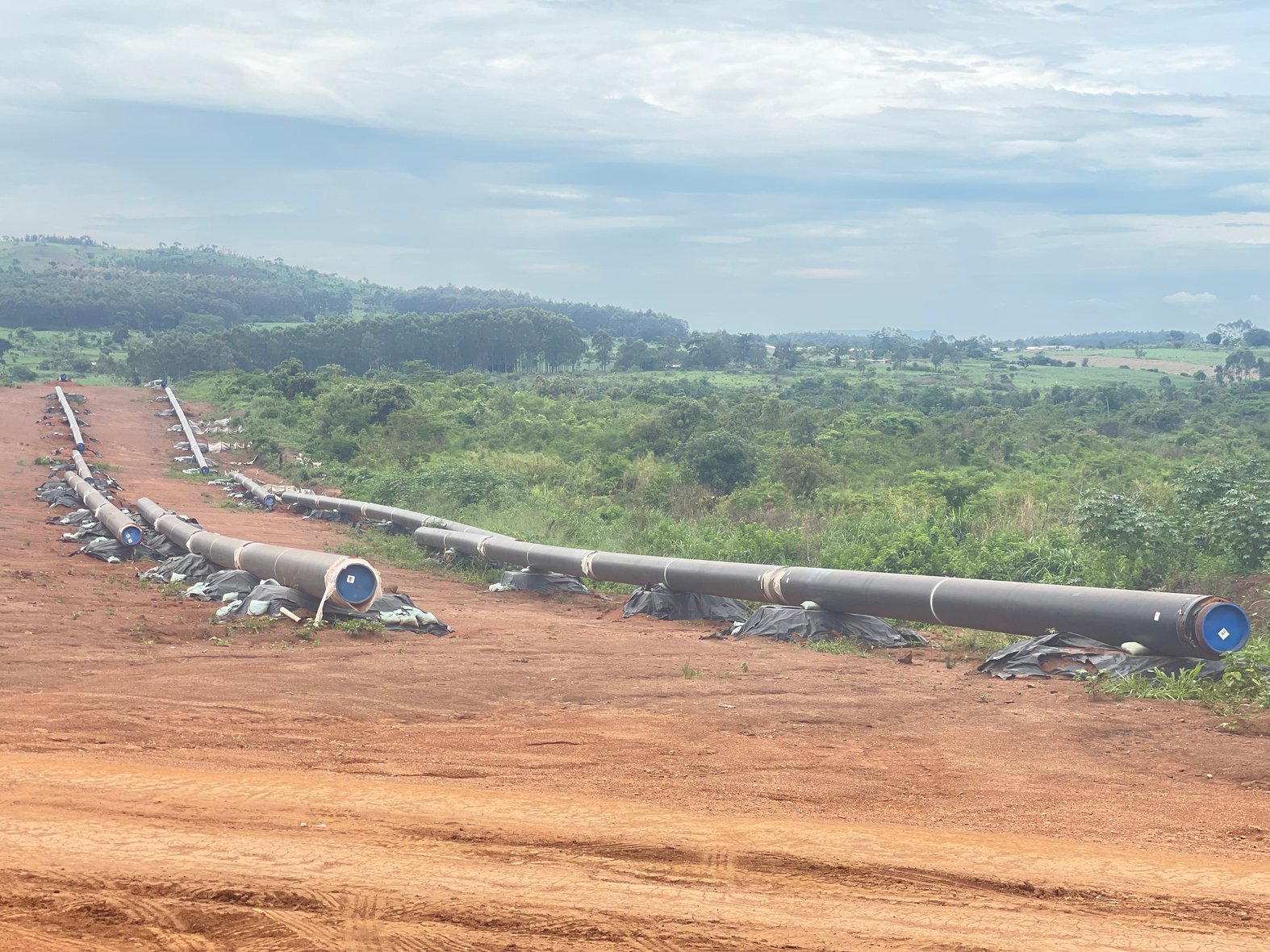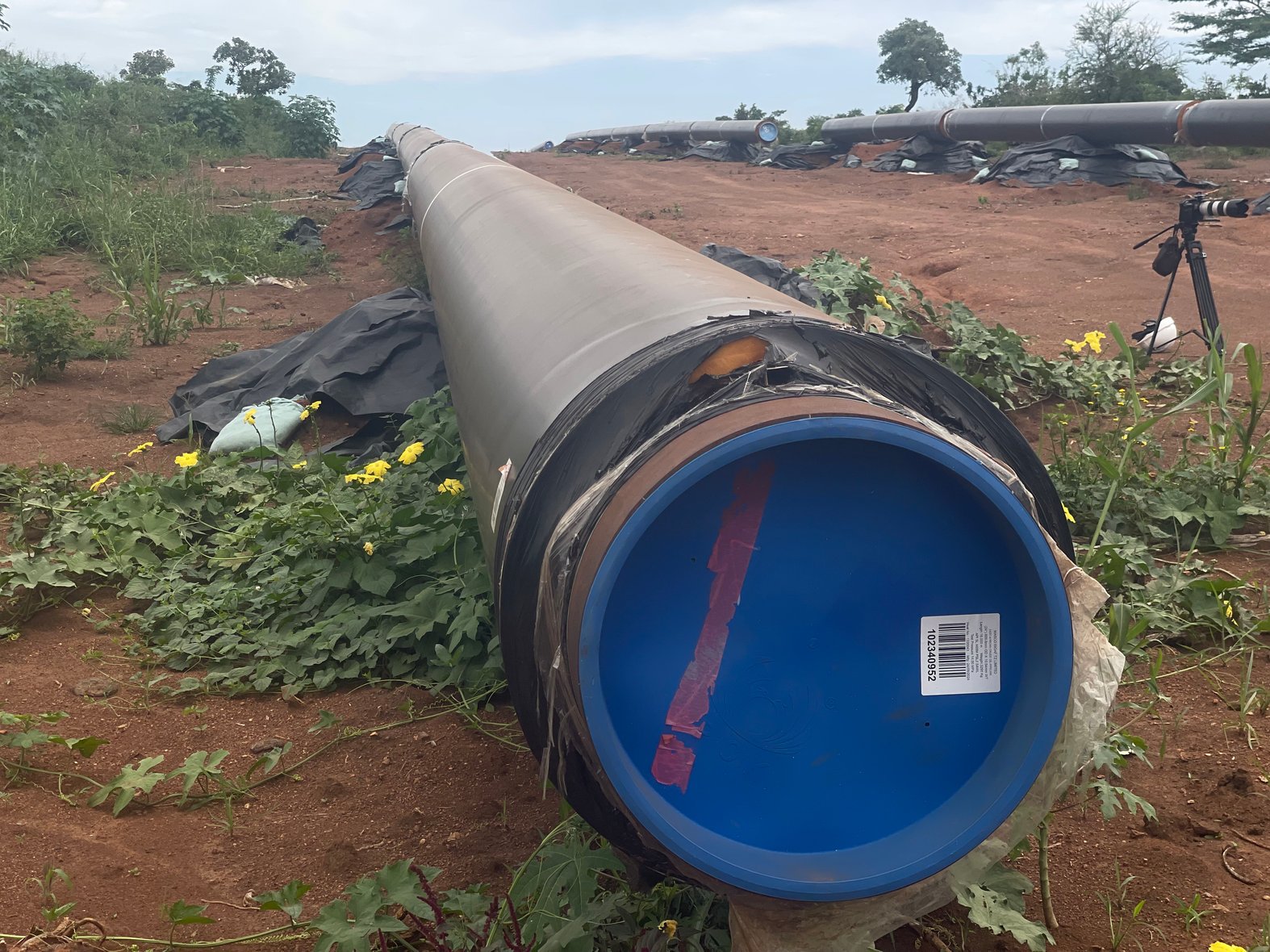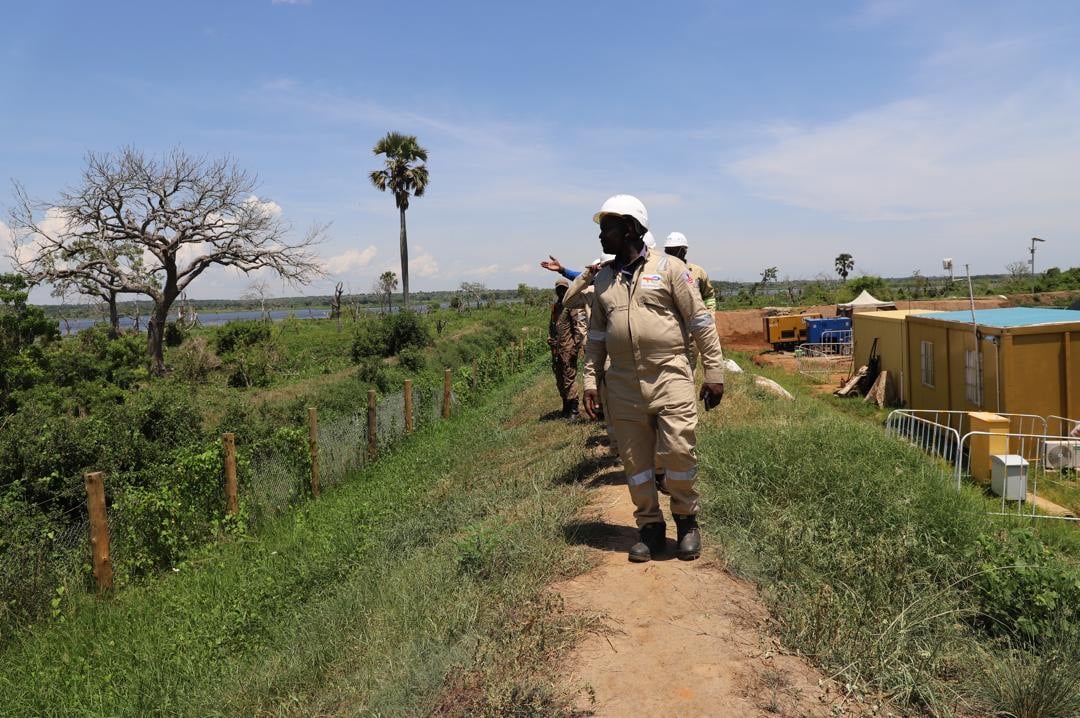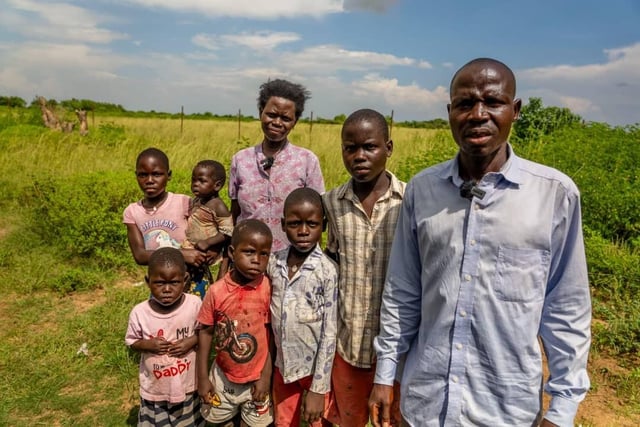
For more than a year, activists successfully pressured dozens of large banks and insurers to pull their support of the East Africa Crude Oil Pipeline, or EACOP. In March, the project finally secured long-delayed financing from syndicate banks to fund the development of a 900-mile crude oil pipeline from Ugandan oil fields to the Tanzanian port city of Tanga. Now activists are trying to stall the project in a new way: in local and regional courts.
It is the latest indication that the $5 billion project will continue to face challenges.
The EACOP project comprises a 1,443km buried thermally insulated crude oil export pipeline that will run from Kabaale, Hoima district in Uganda to the Chongoleani Peninsula near Tanga Port in Tanzania. According to the project’s developers, EACOP has affected a total of 13,686 project people in Uganda and Tanzania.
EACOP is operated through a pipeline company with the same name East African Crude Oil Pipeline Company. Shareholders in the EACOP company are Uganda National Oil Company, on behalf of the government of Uganda, with 15 percent, TotalEnergies E&P Uganda with 62 percent, CNOOC (Chinese National Offshore Oil Company) Uganda with 8 percent, and Tanzania Petroleum Development Corporation, on behalf of the government of Tanzania, with 15 percent.
Environmental lawyers, students and climate change activists have asked the East African Court of Justice EACJ to intervene and stop the project, which is expected to produce around 34.5 million metric tons of carbon emissions annually over its 25 year life span. Campaigners say that these greenhouse gas emissions are a threat to local ecosystems and communities.
“Our last hopes are in the East African Court of Justice,” said David Kabanda, a lawyer for the civil society organizations and team leader at Uganda’s Center for Food and Adequate Living Rights. “There’s pressure from the government, but we have overcome our fears.”
In February, the East African Court of Justice started hearing an appeal brought by several civil society organizations against the dismissal of a lawsuit challenging the construction of the EACOP Project. The case began in 2020 when four Civil society organisations, including Africa Institute for Energy Governance (AFIEGO) and Center for Food Adequate Living Rights (CEFROHT) from Uganda, Natural Justice (NJ) from Kenya, and Centre for Strategic Litigation (CSL) from Tanzania, filed a case at the EACJ seeking to halt the EACOP project for non-compliance to key regional and international laws as well as agreements.The case was filed on behalf of the project affected people whose human and environmental rights have either been violated or are under threat. EACOP, alongside the Tilenga project, has led to the forced displacement of over 120,000 people and is affecting vital environmental resources that millions of East Africans rely on for their livelihoods, health and well being. The First Instance Division of the EACJ initially dismissed the case, over procedural grounds, ruling that it was filed outside the 60-day window for such claims provided for in the East Africa Court treaty, prompting the civil society organizations to appeal. The Appellate Division of the EACJ heard the appeal in February in Kigali-Rwanda, and the case is currently awaiting a decision.
“A win would mean that the case is referred to the court of first instance for trial on merit where we shall get the chance to ventilate the case,” said Dale Onyango, Advocate for Natural Justice, one of the organizations on the case. “This will also allow us to pursue an injunction seeking to stop the construction of the pipeline pending hearing of the case, which will also go a long way in helping affected communities get the much-delayed justice they deserve.”
It’s just the latest in several cases filed across East Africa—from Kampala to Kenya—to stop this and other fossil fuel projects in the region, in 2019, Kenya’s National Environment Tribunal revoked the Environmental Impact Assessment license for a proposed 1,050 MW coal-fired power plant in Lamu County amid protests from the community.
Kato Tumusiime, a human rights Lawyer, believes that while civil society groups have a good case, political interference may influence the court’s ruling.
“The arguments put forward by both sides were convincing.” He said, “My view is that the court may be reluctant to issue a ruling that Ugandan and Tanzanian key stakeholders are unlikely to accept or implement. In the end, the decision is likely to be political, not a legal one premised on environmental laws and policies in the region.”
Last week, the United Nations International Court of Justice-ICJ ruled that countries are responsible for the actions of companies under their jurisdiction or control. The court also ruled that rich countries must comply with international commitments to curb emissions, in a decision hailed by environmental activists.
“The decision, though not legally binding, is likely to have a persuasive impact on regional courts, including the EACJ when deciding climate-related disputes,” said Onyango. “ We hope that the court will adopt the sentiments of the ICJ and pay close attention to the responsibility of member states in exercising due diligence, respecting climate commitments, and the protection of both people and the ecosystem from foreseeable harm.”
Under pressure, the Ugandan government has been forced to respond to activists’ concerns about the EACOP, and it has often done so outside the courtroom. Over the past two years, dozens of lawyers and other activists have been arrested for participating in protests against the project under a draconian colonial era law known as “common nuisance” that was rarely used previously. On numerous occasions, the high handed Ugandan police have also fired teargas into crowds to break the protests.

Photo: Diana Taremwa Karakire
An Economic Win for Some, a Total Loss for Others
As lawsuits and protests target the project’s impact on the environment and communities, some argue that bringing oil from the Lake Albert fields to market would be a financial game changer for Uganda, one of the world’s poorest countries, according to World Bank statistics.
But Ugandan campaigners say that the EACOP project threatens the country’s future investments, even if it may give the economy a reprieve in the short term.
“There are often claims that this project will lead to economic prosperity and development for Ugandans. But if we look at the fossil fuel industry globally, we see a repeated pattern, the wealth and benefits generated are typically captured by political elites,” said Richard Pearshouse, Director of the Environment and Human Rights Division at Human Rights Watch. “We’ve seen this trend in countries like Nigeria, Mozambique, and across other parts of the continent. Unfortunately, I expect a similar outcome here.”
Some of TotalEnergies’ oil wells are located in Uganda’s largest national park, home to giraffes, elephants, leopards and dozens of endangered species. The pipeline will snake along Lake Victoria, Africa’s biggest lake and one of the sources of the Nile River. Neighboring Congo’s government has come under similar pressure, including from the U.S. government, which is increasing its own oil and gas development while eliminating environmental regulations, for plans to auction off oil and gas fields in some of its vast rainforests and peatlands.
Joseph Kobusheshe, the Director of Environment, Health, Safety, and Security at Petroleum Authority Uganda, says that the government has evaluated the environmental risks associated with oil projects and implemented mitigation measures.
“Fossil fuels are the main cause of climate change worldwide, which leads to losses and damage to societies, economies and the environment,” said Dr Mary Nantongo, lecturer and director at the Climate Finance and Sustainability Centre at Makerere University Business School. “Yet, these risks are either ignored or not adequately considered in investment decisions for Uganda’s oil and gas sector.”
EACOP construction progress is now visible on the ground in Uganda with pipes being laid along the pipeline routes. EACOP has compensated 97 percent of Project Affected Persons in Uganda according to Petroleum Authority Uganda. However concerns persist among affected people who cite unfair and inadequate compensation and a lack of transparency in the resettlement processes, as well as concerns over the potential impacts of the pipeline on the environment.
“It is high time the government had honest discussions about the social and economic challenges faced by communities displaced by oil and gas projects. Affected people face issues of inadequate compensation for their land which has impacted food production and livelihoods. Most of them can’t afford to buy land elsewhere with the money received in compensation,” said Balach Bakundane, coordinator of EACOP host communities.

Members of civil society groups inspect the pipeline at a drill site where EACOP crosses the River Nile. Photo: Diana Taremwa-Karakire
From the Streets to the Courts
John Lubega Nsamba is one of the affected people from Kyotera district in Uganda. He travelled to Kigali in February to attend the hearing of the EACOP case at the EACJ, representing his 79-year-old father, John Mary Nsamba, who is currently battling cancer at the Uganda Cancer Institute in Mulago.
Last year,the Ugandan government sued his father at the High Court in Masaka after he refused to accept compensation for 2.71 acres of land in Kyotera District, which falls in the path of the pipeline.The court in Masaka ruled in favor of the government, ordering the family to vacate the land and allowing EACOP to proceed with its acquisition. Lubega’s family appealed the decision through their lawyers in November 2024. However, they are still waiting for a hearing date to be fixed. In the meantime, they’ve been instructed not to use the land. In November, their home was visited by military personnel who threatened to beat up his father for refusing the compensation money.
“My father doesn’t want to sell any part of the land which he inherited from our forefathers,” Lubega said. “Now they are taking it away from us for a project that will harm the environment. Our only hope now is with the East African Court of Justice to deliver justice for project affected persons like us.”
According to the United Nations Environment Programme, the number of suits related to climate change across the world has more than doubled in the past five years, reaching more than 2,180 across 65 jurisdictions as activists seek to halt shrinking water resources and dangerous heat waves attributable to global warming. About 17 percent of cases have been filed in developing countries, including Indonesia, Brazil, and Uganda.


